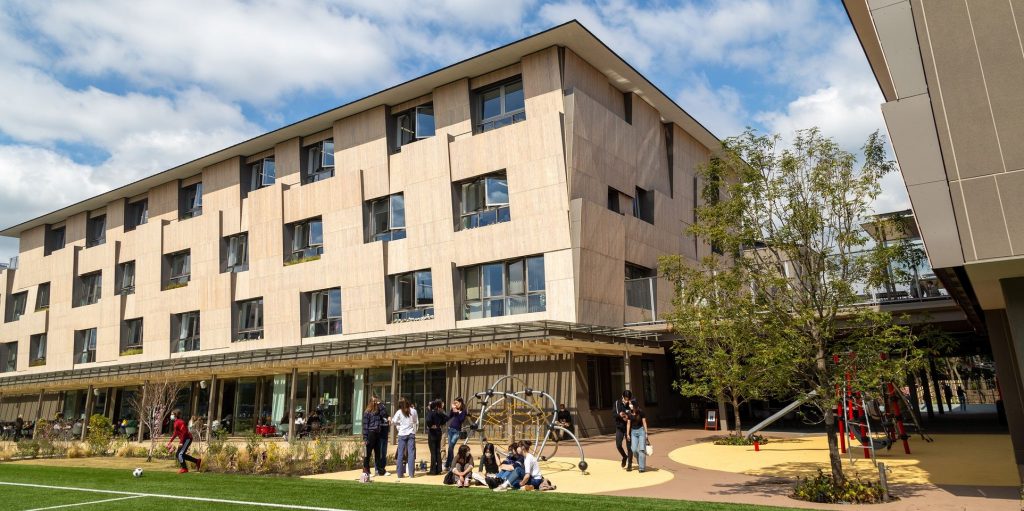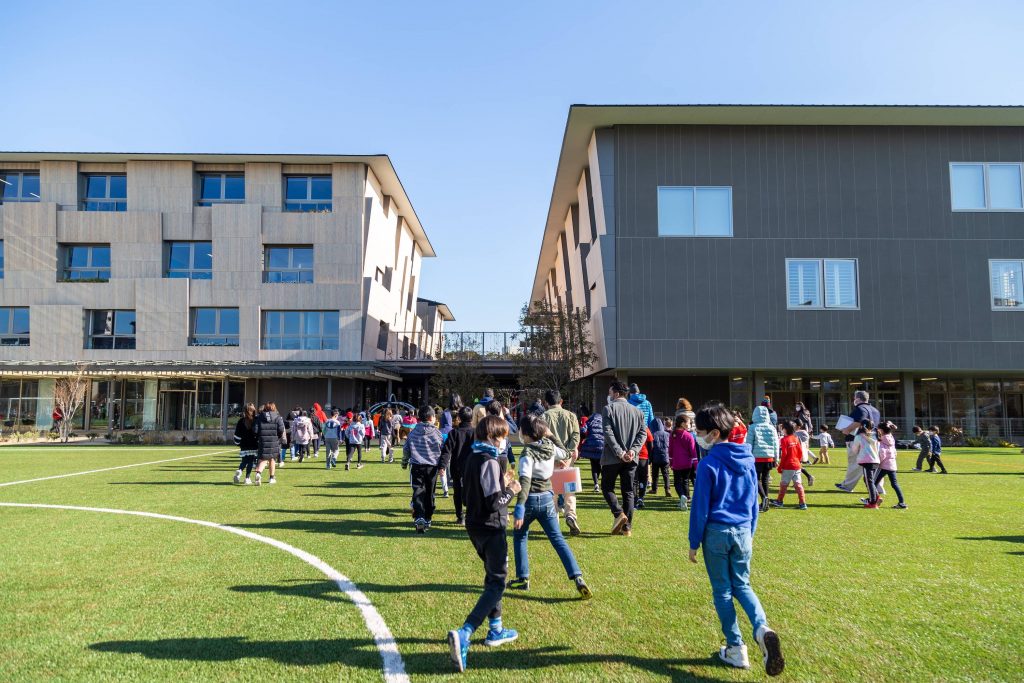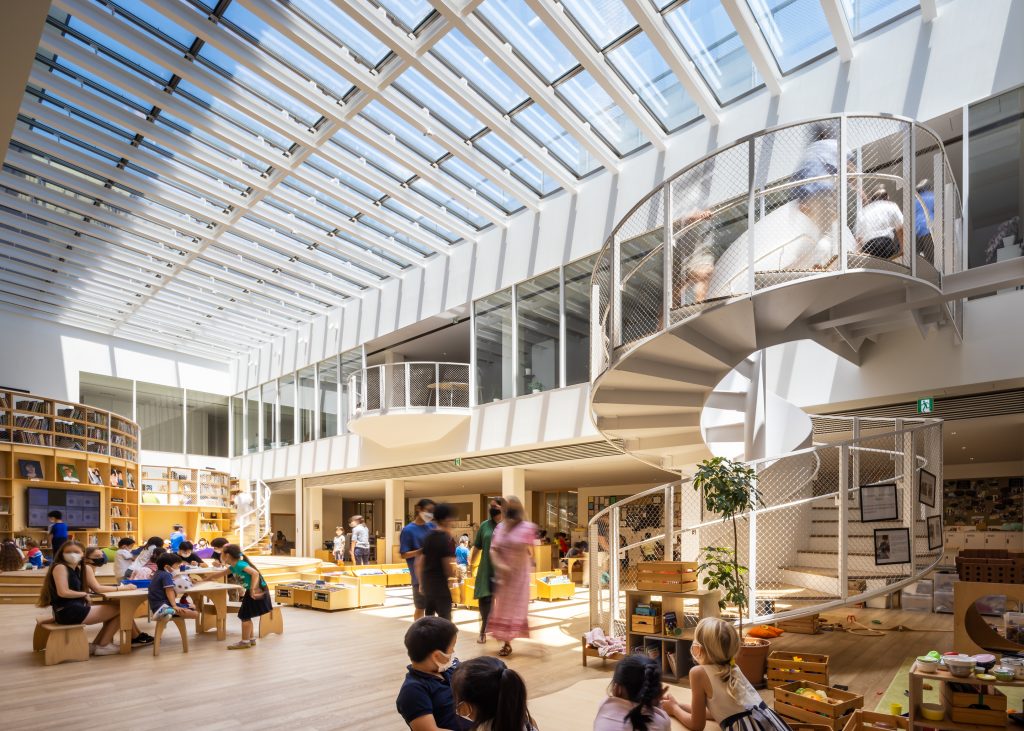Yokohama International School (YIS) Review

Yokohama International School is an international school catering mainly to expatriate families living in and around the Yokohama area. The school educates preschool through 12th grade and while English is the language of primary instruction, Japanese, French, Spanish, Chinese and German are also taught. The school is a day school, and has no boarding facilities.
YIS was founded in 1924 with a student body of six, shortly after the Great Kanto Earthquake, making it one of the oldest international schools in Japan. In fact, YIS is believed to have been only the second school to use the word ‘international’ in its name. After being forced to close during the war, the school was eventually reopened in 1955, growing rapidly in enrollment throughout the subsequent years. In 1986, the school began offering the International Baccalaureate Diploma Program and more recently became a International Baccalaureate continuum school, offering the Primary Years Program (PYP), Middle Years Program (MYP) and the Diploma Program (DP).
Today, the school educates over 700 students representing 45 different nationalities, and has a bright future ahead. Currently in development, a new campus is set to be built in Kominatocho, Naka-ku, Yokohama, which, at about 50% larger than the current site, will accommodate a full-size athletic field, double gymnasium and swimming pool in addition to the classroom buildings.

Admissions
Yokohama International School serves the educational needs of the international community in Yokohama and the nearby Tokyo metropolitan area, in particular the children of foreign nationals on temporary assignment for whom the local Japanese education system is not a viable option. YIS does not discriminate against individuals on the basis of race, color, gender, gender expression, sexual orientation, religion, disability, age, or national or ethnic origin in the administration of its admissions policies. The school accommodates students with diverse learning where possible. Applicants with mild social/emotional issues, learning differences or other learning needs are referred to in-house learning support staff for review. Admissions decisions are then made by the YIS principal based on the recommendation of the learning support staff.
Children whose parents are both Japanese nationals may be eligible for admission to Yokohama International School if the student has been educated exclusively or primarily at international or non-Japanese schools overseas or at other accredited international schools in Japan where English is the primary language of instruction. It is a requirement that at least one parent or guardian must be able to communicate comfortably in English.
As part of the YIS’s commitment to educating the children of foreign nationals in Japan on temporary assignment, the school often reserves a certain number of places at each grade level for children relocated to the area on short notice up until Spring Break (late March). Provided that basic eligibility requirements are met, students newly arriving in Japan are admitted on a first-come, first-served basis. When demand exceeds availability, students will be placed in a wait pool until space becomes available.
When the number of eligible applicants exceeds the availability of spaces for a particular grade year, students may be placed in a wait pool until space becomes available. Students with siblings already enrolled at YIS are given priority status within the wait pool, as are children of YIS staff and alumni, and students returning to Japan who have previously attended YIS. The school also considers a number of other factors when determining admission from the waitlist, including whether the student has other viable educational options, his/her level of English and general academic proficiency, and the gender and nationality balance of the class/grade.
Specific admissions and English Language Ability policies by school level are given below:
Early Learning Center and Elementary School:
The Early Learning Center is a mixed-age program composed of 3 and 4 year old children. The 3-year-olds enroll initially for a half-day program, which can be extended to a full-day program at the request of the parent if the child’s teacher recommends this. 4-year-old children generally attend the full-day program. Applicants to the ELC will go through an initial screening and then may be invited to an interview with both parents.
In reviewing applications for admission to grades K – 5 YSI considers current/prior school records and a confidential recommendation from a classroom teacher countersigned by the principal. Students may also be invited to attend YSI on a trial basis to assess their ability to access the curriculum.
In the ELC and Elementary school children are admitted regardless of their level of English language proficiency, providing there are no other additional learning needs. However, the school does not advise mid-year admission for Grade 5 students with minimal English ability.
Middle School:
Children applying for admission to grades 6 – 8 are not normally required to have a formal interview. In reviewing an applicant’s eligibility YSI takes into account the student’s school records alongside two confidential recommendations, one from a current English teacher and the second from a faculty member who knows the student well and countersigned by a principal or head of school. Students may also be required to take an assessment test.
Students entering grades 6 – 8 must generally have sufficient competency in English in order to benefit from YIS’s academic programs.
High School:
At the high school level, applicants will normally need to meet with an academic counselor, and potentially an IB DP coordinator, in addition to an informal interview with the high school principal. In reviewing an applicant’s eligibility YIS looks at the student’s school records for the last three years (including official transcript(s) for any other high schools attended), as well as two confidential recommendations, one from a current English teacher and the second from a faculty member who knows the student well and countersigned by a principal or head of school, and a math placement recommendation from a current mathematics teacher.
Given the rigour of the IB DP academic program, applicants for grades 9+ must have a fairly high degree of competency in English. Moreover, in order to obtain a YIS graduation diploma, students must have credits equivalent to four full years of high school English.
Regardless of the grade level to which you are thinking of applying, YIS encourages all potential students to visit the school and meet with the relevant school principal.
At any stage if English Language Requirements are not met, the school may require an English assessment or allow a student to enroll on a trial basis. The school may also ask parents to provide supplementary English tutoring at their own expense as a condition for admission.

Education
As an IB Continuum School, offering the Primary Years Program, Middle Years Program and Diploma Program of the International Baccalaureate, YIS offers a high-quality, internationally-oriented education across all grade levels.
Through the IB Continuum, students are encouraged to think critically and question everything they are taught. Problems are framed from both a local and an international perspective and since the curriculum is separate from any specific government or national curriculum, it is able to incorporate the most significant pieces of each subject taught. IB Diploma candidates are well-equipped for demanding workloads and college-level coursework involving research.
Early Learning Center (ELC):
From 3 to 5 children learn communication through music, dramatic play, sculpture, painting, drawing, singing, dancing, photography, video, words, stories, poems, and physical movement, in a play-based curriculum that is guided by the principles of the IB Primary Years Program (PYP). Through playing with other children, students begin to develop the skills reflected in the IB Learner Profile, which will benefit them for all the later stages of their schooling. Teachers observe each students’ process of thinking and understanding to support each student with their specific needs. Students attend the ELC on either a half-day or a full-day basis, to be determined in accordance with the school, and specialist physical education and music classes are held once each week.
Elementary school:
In Elementary School, students study some combination of Art, Drama, English as an Additional Language, Home and Family Language (The students’ native language), ICT, Japanese Language, Foreign Language, Mathematics, Music, Physical Education, Personal Social Education, Science, and Social Studies. Following the recommendations and curriculum of the IB PYP, students explore a wide range of academic, social, and emotional topics.
Middle School:
In Middle School, students begin to learn how to incorporate more independence into their learning. The IB Middle Years Program (MYP) provides the framework that guides the YIS curriculum through educating critical and creative thinkers. Students study Music, Drama, Visual Arts, English, Languages (French, Spanish or Japanese), Individuals & Societies, Mathematics, Physical Education, Design, and Science. Student’s also have a tutor period designed to focus on social skills, decision making and the development of independence.
Technology is featured frequently in the classroom to ensure that students are comfortable using the latest tools for learning. For example, each student is provided with a personal computer and teachers integrate learning technologies into their regular lessons.
High School:
Students in grades 9 and 10 complete the last two years of the IB Middle Years Program, and then move on to the comprehensive two-year Diploma Program in grades 11 & 12. To complete the Diploma Program, each student must complete 3 higher level and 3 standard level courses alongside core requirements and Yokohama strives to provide the first choice subjects for every student. As is typical for the Diploma Program Curriculum, each student will also need to complete the Theory of Knowledge (ToK), Extended Essay (EE), and Creativity, Action, Service (CAS) sections of the Diploma. While many combinations of courses are possible, limitations on which subjects can be selected together are imposed by the structure of the Diploma Program and these limitations can be explored further on the Diploma Program website.
Some students in grades 11 and 12 may choose to take one of their DP courses online. These courses, offered in partnership with Pamoja Education, provide an increased number of subject options to students and allow them to learn alongside teachers and classmates from other IB schools around the globe.

Leadership, Extracurriculars and Sports
Academic learning at Yokohama is enhanced by a number of programs that encourage holistic growth and development of students. These include a number of field trips and outdoor “expeditions,” a service program that enables students to connect with their local and global community, and a plethora of extracurricular clubs and sports to practice participation, leadership and physical skills.
The Outdoor Education program at YIS promotes learning, skill building and a risk taking attitude in the wilderness. As a result, “expedition week” becomes an integral part of the curriculum at YIS. From grade 4 onwards, the program takes students through a variety of physical environments and emphasises leadership by encouraging students to lead teams through group challenges. There is a unique expedition for every grade level that introduces students to a range of activities including hiking, diving, rafting and snowshoeing.
Service is another integral part of the student experience at Yokohama, and the many service opportunities at the school enables students to engage with and contribute towards community on a local and international level. Beyond contributing to society, service clubs at Yokohama remain focused on the development of the participating students. Through breaking down barriers of age, ability and status, students develop skills that are useful in the classroom and beyond. Service challenges that Yokohama students tackle include homelessness through the Chiku Centre Support Group and the Sanagitachi Service Club, environmental degradation through YIS Underwater Explorers and the High School Environment Club, human displacement through Refugees International Japan (RIJ) and the Combating Human Trafficking Group, and many others. There are also affinity groups for many different genders, sexual orientations, religions, races and ethnicities.
Sports teams at YIS compete at a high level while retaining a focus on fun, inclusion, and skill development. Middle School and High School sports teams play against other international schools in and around Tokyo through the Kanto Plains Association, and some High School teams compete in ASIA league events against schools in Japan and Korea. Sports are split into Fall, Winter and Spring seasons and include volleyball, cross country, tennis, soccer, basketball, field hockey, badminton and baseball. High School students practice Monday/Wednesday/Friday from 16:00-18:00, and Middle School practice runs at the same time Tuesday/Thursday. YIS campus athletic facilities include a gymnasium, futsal field, and dance studio and teams utilize an all-weather surface pitch at Yokohama Country & Athletic Club as their home ground. The new YIS campus in development will incorporate its own athletic field, double gymnasium and indoor swimming pool.
For musicians and artists, there are a number of clubs available to join including drama, art, a number of dance groups, many different instrument practice groups, and a range of band genres and ensembles. There is also a plethora of other clubs for students to get involved with, incorporating everything from astronomy to gardening. Many clubs, such as student council, have an explicit leadership focus.

Outcomes
Over the three most recent examination cycles, IB Diploma Candidates at YIS have enjoyed a pass rate of 99% and an average score of 35 out of 45, compared to a global average of an 80% pass rate with an average score of 30 points.
In the ACT, 75% of YIS students scored above a 26, compared to only 18% of students globally, and 25% of YIS students scored above a 32, compared to 3% of students globally. This impressive record is carried over to the SAT®, in which 75% of YIS students scored above a 1100, compared to 38% of students globally, and 25% of YIS students scored above a 1360, compared to 8% of students globally.
The High School program at YIS provides ample opportunity for students to evaluate what they value in education and therefore which educational context will suit them best after graduation. By limiting each student to 10 university applications, the school encourages students to focus their applications on the colleges and universities that will be the best “fit” for their specific personality. Over the three most recent application cycles graduating seniors went on to study in the United States (32%), the United Kingdom (23%), Asia (17%), Canada (16%), Europe (11%), and Australia/New Zealand (1%), at universities including:
- Hong Kong University of Science and Technology
- Keio University
- Waseda University
- Seoul National University
- The University of Cambridge
- Imperial College London
- Cornell University
- New York University
- The University of California, Berkeley
- The University of Toronto
Around 5% of graduating YIS students pursue gap years or other opportunities.
The information in this report comes from the experiences of Yokohama students, the expertise of Tokyo Academics educators who work with students from Yokohama on a regular basis, The Good Schools Guide International and the Yokohama International School webpage.
SAT® is a trademark owned by the College Board, which is not affiliated with, and does not endorse Tokyo Academics.

